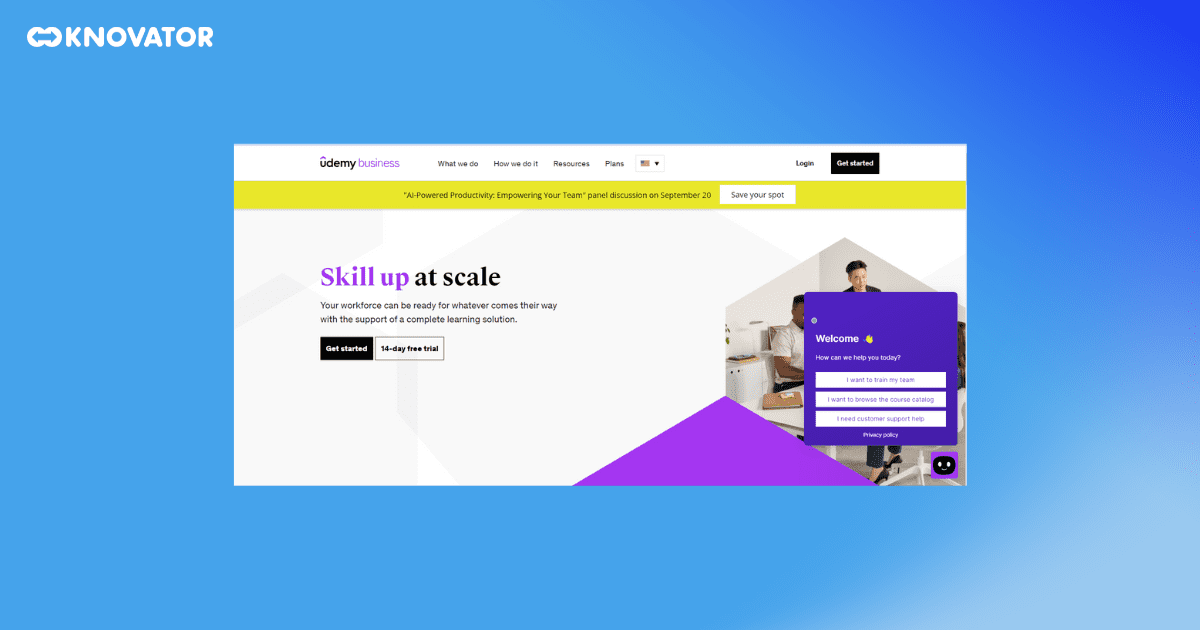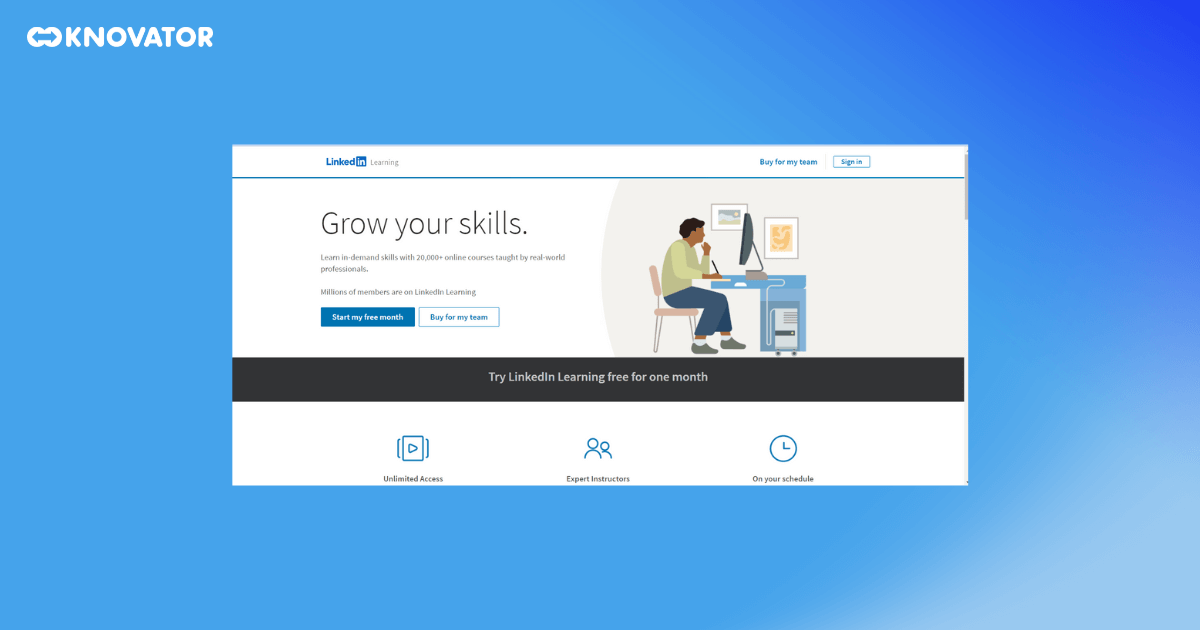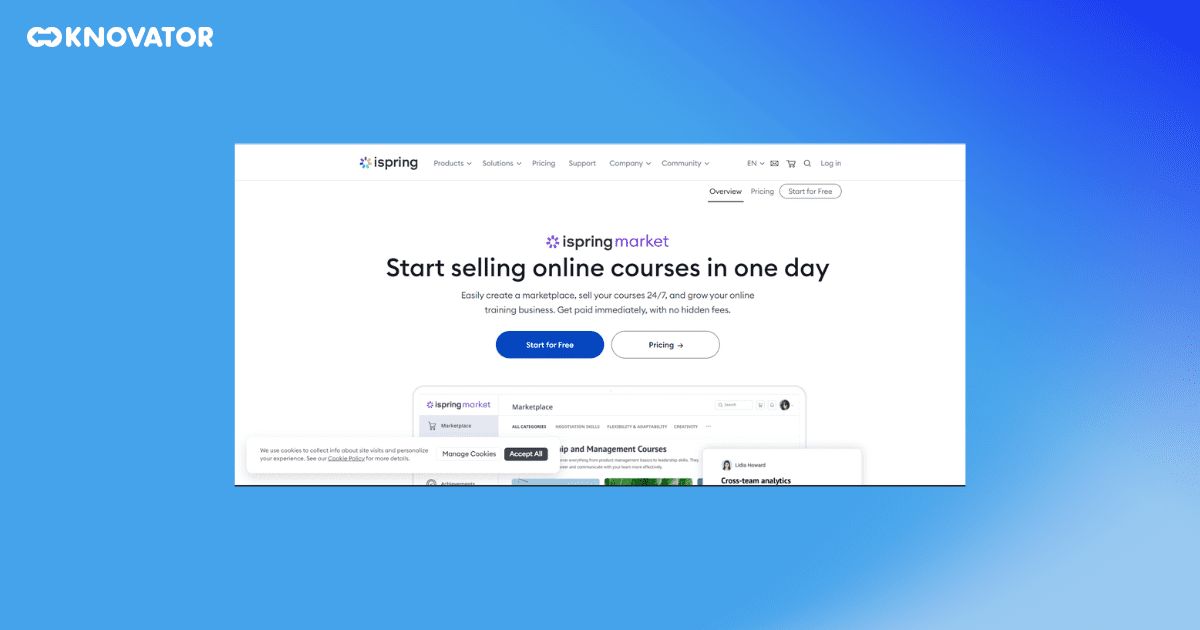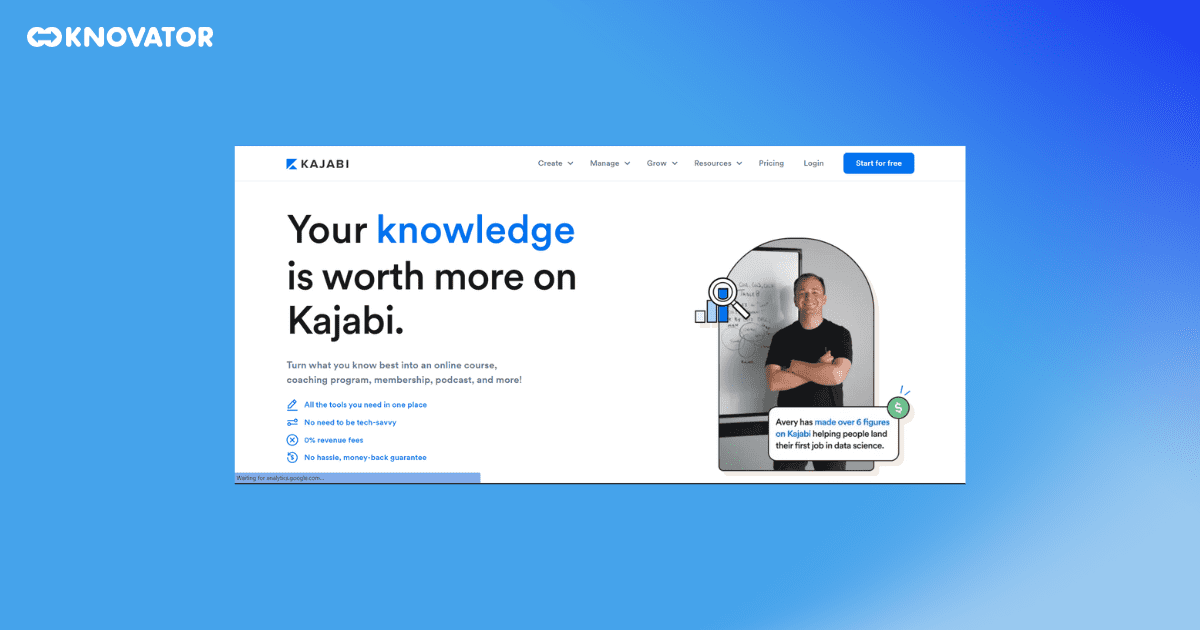Navigating the Learning Landscape: 2024’s Best Online Learning Platforms

Today, we’re diving into the world of online learning platforms. These platforms have revolutionized education, making learning accessible anywhere and anytime. In our digital age, they’ve become increasingly important, providing opportunities for personal development, career advancement, and even a shift in career paths.
Choosing the right platform can be a game-changer. It can mean the difference between a mediocre and an exceptional learning experience. But with so many options out there, how do you choose? Well, it depends on your needs. Are you a learner seeking to expand your knowledge? Or are you a course creator looking to share your expertise? Different platforms cater to different needs, so choosing one that aligns with your goals is important.
In the digital landscape, learning platforms have emerged as transformative tools enabling individuals to access education from their homes. Let’s explore the three main categories of learning platforms and understand their distinct roles in revolutionizing education.
Online Learning Platforms

The beauty of online learning platforms lies in their diverse course offerings. Students can embark on a journey of self-improvement, exploring areas of interest that may not be available in traditional educational settings. Whether one desires to learn a new language, develop coding skills, or study art history, there is likely a course tailored to those interests. These platforms have broken down barriers to education, empowering learners across all ages and backgrounds to pursue knowledge and unlock their true potential.
Online Course Platforms

These platforms provide a seamless course creation process, allowing instructors to structure their content effectively. With features like payment processing and student registration, course creators can concentrate on delivering quality content without being burdened by administrative tasks. Analytics tools help monitor course performance and identify improvement areas, ensuring that educators can refine their offerings and deliver an enhanced learning experience.
Moreover, online course platforms have opened up new opportunities for entrepreneurs and experts in various fields to monetize their knowledge. With the potential to reach an audience worldwide, individuals can transform their expertise into a viable source of income, all while empowering learners with valuable skills and insights.
Learning Management Systems (LMS)

Primarily utilized by businesses, LMSs offer a centralized platform for employee training. They allow companies to create comprehensive course catalogs, enabling employees to access relevant training material effortlessly. Additionally, LMSs provide learning paths that guide employees through a structured sequence of courses, ensuring a progressive learning experience.
One of the most significant advantages of using LMSs is the ability to track and assess employee progress. Businesses can generate insightful reports, identifying areas where employees excel and require additional attention. This data-driven approach aids in making informed decisions regarding employee development and performance evaluation.
Review of Top Online Learning Platforms
In today’s rapidly changing world, continuous learning is necessary for personal and professional growth. Fortunately, with the advent of technology, online learning platforms have emerged, providing accessible and flexible opportunities for individuals to upskill and gain knowledge in various fields. These platforms have transformed the traditional education landscape, making education available to a global audience.
We will now delve into some of the top online learning platforms available, discussing their features, advantages, disadvantages, pricing models, and target audience. By the end of this blog, you will have a clearer understanding of which platform aligns best with your learning objectives and preferences.
1. Udemy Business

Features: Udemy Business provides an extensive collection of on-demand courses taught by industry experts, covering leadership, project management, data analysis, and more. The platform also offers personalized content recommendations and progress tracking to ensure effective learning outcomes.
Pros: One of the significant advantages of Udemy Business is its flexibility. Employees can access courses at their own pace and convenience, allowing them to balance work responsibilities with learning. The platform’s cost-effectiveness is another plus point, as it offers a subscription-based model with unlimited course access.
Cons: While Udemy Business offers a wide range of courses, the quality of content may vary since instructors can create courses without stringent verification. Additionally, the platform might lack the rigor and academic depth of university-based online courses.
Pricing: Udemy Business employs a subscription-based pricing model, making it cost-effective for companies looking to provide continuous learning opportunities to their workforce.
Best Suited For: Udemy Business is ideal for businesses and organizations seeking a flexible, budget-friendly solution to upskill their employees across various domains.
2. Skillshare

Features: Skillshare stands out for its emphasis on project-based learning, enabling students to apply the skills they learn in real-world scenarios. The platform offers many courses, encompassing both beginner and advanced levels. Skillshare’s interactive community fosters collaboration and feedback among learners.
Pros: Skillshare’s engaging and project-oriented approach appeals to learners who prefer hands-on experiences. Moreover, its affordability, with a subscription-based model, makes it accessible to a broad audience. The sense of community on the platform encourages networking and skill sharing.
Cons: While Skillshare excels in creative subjects, its offerings may be limited in more technical or specialized fields. Additionally, as the courses are not accredited, they might not carry the same weight as formal educational programs in certain professional settings.
Pricing: Skillshare offers both free and premium subscription plans. The premium plan unlocks the full course library, offline viewing, and other perks.
Best Suited For: Skillshare is perfect for individuals exploring and developing their creative talents through project-based learning and community engagement.
Also Read: Best Job Boards for College Students: Top 19 Picks
3. LinkedIn Learning

Features: LinkedIn Learning provides a vast library of courses by industry experts and practitioners, ensuring high-quality content. Users can access courses on the LinkedIn Learning website or through the LinkedIn mobile app, making it easily accessible for professionals on the go. The platform also offers skill assessments and personalized course recommendations based on individual career goals.
Pros: LinkedIn Learning’s integration with LinkedIn allows learners to showcase their completed courses and newly acquired skills directly on their professional profiles, boosting their credibility to potential employers or clients. The platform’s focus on professional development aligns well with career advancement objectives.
Cons: The pricing for LinkedIn Learning can be relatively high compared to other platforms. While integrating with LinkedIn is advantageous for professionals, it might feel less relevant for individuals not actively using the LinkedIn networking platform.
Pricing: LinkedIn Learning offers a subscription-based model with monthly and annual pricing options.
Best Suited For: LinkedIn Learning caters to professionals focused on enhancing their business, technology, and creative skills and wishing to showcase their accomplishments on their LinkedIn profiles.
4. Coursera

Features: Coursera’s course catalog includes offerings in various disciplines, such as computer science, business, humanities, and more. Courses are typically structured with video lectures, quizzes, and assignments. Learners can choose between audit-only access or pursuing a verified certificate, which adds value to their accomplishments.
Pros: Coursera’s collaboration with reputable universities and institutions ensures high-quality educational content. Learners seeking more structured learning experiences will find Coursera’s courses well-organized and comprehensive. Additionally, earning verified certificates can add credibility to one’s resume.
Cons: The cost of earning verified certificates can be relatively high, which may deter some learners from opting for them. Furthermore, Coursera’s courses follow a set schedule, which might not be ideal for those seeking complete flexibility in their learning journey.
Pricing: Coursera offers both free and paid courses. The cost of obtaining a verified certificate varies depending on the course and institution.
Best Suited For: Coursera is a suitable platform for learners seeking structured, university-level courses and certifications from renowned institutions.
Also Read: Discover the benefit of having a job board software for universities
5. edX

Features: edX provides various courses across disciplines, including computer science, humanities, engineering, and more. Courses are often self-paced, allowing learners to progress at their convenience. Additionally, edX offers the option to pursue MicroMasters programs and even full degrees in certain subjects.
Pros: The availability of MicroMasters programs and degree options sets edX apart from many other platforms, as it caters to learners aiming for more extensive and recognized credentials. The platform’s open-source approach fosters collaboration and innovation in online education.
Cons: While edX offers many free courses, the cost of certificates, MicroMasters, and degrees can be relatively high. The structure and depth of courses can vary depending on the institution providing the content.
Pricing: edX courses can be audited for free, but learners must pay for verified certificates and advanced programs.
Best Suited For: edX is ideal for learners seeking university-level courses, professional certificates, or even full degree programs in various subjects.
6. iSpring Market

Features: iSpring Market provides tools for creating interactive and engaging courses with multimedia elements, quizzes, and assessments. The platform’s user-friendly interface makes course creation accessible to users with little technical expertise. Additionally, it offers e-commerce capabilities, allowing course creators to monetize their content.
Pros: iSpring Market empowers content creators to control their courses and branding fully. The ability to sell courses directly to learners offers revenue potential for entrepreneurs and businesses alike.
Cons: As a platform geared toward course creators, iSpring Market may not have as extensive a course library as some larger platforms. Moreover, while it provides course creation tools, the course’s success depends on the quality and marketing efforts of the creators.
Pricing: iSpring Market has a subscription-based pricing model, with different tiers offering varying features and capacities.
Best Suited For: iSpring Market is best suited for individuals and businesses looking to develop and sell their online courses independently.
7. Kajabi

Features: Kajabi offers a comprehensive suite of tools, including course creation, website building, marketing automation, and payment processing. The platform’s intuitive interface and ready-to-use website templates simplify the process of building and launching an online course.
Pros: Kajabi’s all-in-one approach eliminates the need for integrating multiple tools, streamlining the course creation and marketing process. The platform’s focus on marketing features facilitates effectively reaching and engaging with the target audience.
Cons: While Kajabi provides an excellent course creation and marketing solution, its pricing might be higher for individual course creators or small businesses.
Pricing: Kajabi offers different pricing plans, ranging from basic to more advanced options, depending on the features required.
Best Suited For: Kajabi suits entrepreneurs, coaches, and businesses looking for an all-in-one platform to create, market, and sell courses and digital products.
Start Your Learning Journey
In this era of rapid developments in technology and continuous learning, online learning platforms have become indispensable tools for personal and professional growth. Each platform discussed in this review has its unique strengths and target audience.
If you’re seeking a budget-friendly and flexible solution for employee upskilling, Udemy Business might be the right choice. For creative individuals looking to hone their talents, Skillshare offers a project-based and community-oriented approach. LinkedIn Learning caters to professionals seeking to enhance their business, technology, and creative skills while showcasing their accomplishments on LinkedIn profiles.
For learners interested in structured university-level courses and certifications, Coursera and edX provide comprehensive options. Additionally, edX stands out with its MicroMasters programs and degree offerings. If you’re an individual or business interested in creating and selling courses, iSpring Market or Kajabi may be the right fit, with each offering unique features to support course creators’ needs.
Ultimately, the best online learning platform depends on your specific goals, preferred learning style, and budget. Embrace the opportunities these online learning platforms provide, and embark on a path of continuous growth and knowledge acquisition. Happy learning!





